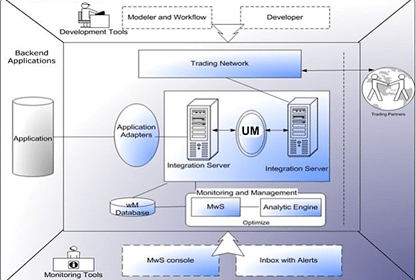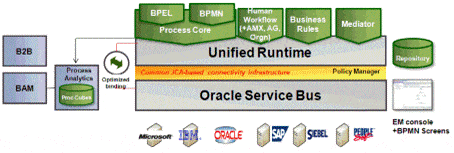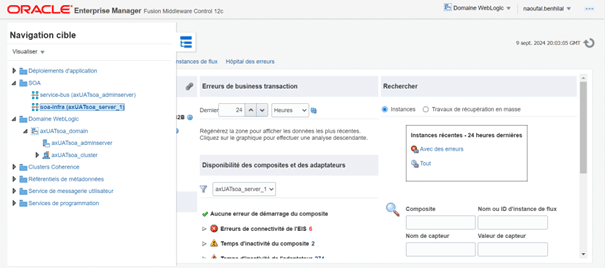When it comes tointegrating information systems, middleware solutions play an essential role.
Software AG’s WebMethods and Oracle SOA Suite represent two major market players, each with its own technical specificities and competitive advantages. Although they share similar objectives, they differ significantly in their architectures, interfaces and integration capabilities.
This article explores seven major differences between WebMethods and Oracle SOA Suite, and presents specific use cases to help you choose the solution best suited to your needs.
1. WebMethods or Oracle SOA Suite: architecture and technical design
WebMethods

WebMethods from Software AG adopts a modular, service-oriented architecture(SOA). Its suite includes application integration, business process management (BPM) and API management services, offering great flexibility and extensibility.
Thanks to its modular architecture, it can deploy its components (application integration, BPM, API management) individually as required.
Its adoption ofSOA architecture enables services to be reused and combined, facilitating rapid adaptation to change.
Interoperability with various systems and protocols enhances integration in heterogeneous environments.
And its API management enables efficient service governance, while its cloud and hybrid capabilities ensure maximum scalability and flexibility for modern businesses.
Oracle SOA Suite

Oracle SOA Suite is an integrated SOA-based platform that centralizes service management using components such as Oracle Service Bus, BPEL Process Manager and Oracle Business Activity Monitoring.
This monolithic approach simplifies the management of business processes and services in an enterprise environment, particularly for companies already using other Oracle products (such as Oracle ERP or Oracle Cloud).
Is it just for Oracle companies?
No, although optimized for the Oracle ecosystem, Oracle SOA Suite can integrate with non-Oracle systems thanks to its compatibility with open standards (SOAP, REST, JMS). However, companies using Oracle products will benefit from a smoother, more optimized integration.
2. User interface

WebMethods’ user interface is often described as more intuitive and user-friendly, with a range of graphical editors making it easier to design and manage processes and integrations.

Oracle SOA Suite also has a graphical interface, but it can appear more complex and less intuitive, especially for new users. The various components often require specific skills, increasing the learning curve.
3. Integration and connectors
Software AG ‘s WebMethods is renowned for its integration flexibility, thanks to an extensive library of predefined connectors that simplify integration with different systems, applications and services.
Examples of WebMethods connectors
Here are some examples of connectors provided by WebMethods:
- ERP connectors: Integration with systems such as SAP, Oracle E-Business Suite, and Microsoft Dynamics.
- CRM connectors: Connections with solutions such as Salesforce, SugarCRM and Zoho.
- Database connectors: Support for Oracle, MySQL, SQL Server and IBM DB2 databases.
- Cloud Connectors: Integration with platforms such as AWS, Microsoft Azure, Google Cloud, and Salesforce for SaaS application management.
- B2B application connectors: Connectors for EDI, AS2, FTP and SOAP to facilitate data exchange between companies.
- IoT and Big Data connectors: connect with IoT solutions, Hadoop, and big data processing systems.
Examples of Oracle SOA Suite connectors
Oracle SOA Suite also offers a wide range of connectors, but these are often more oriented towards the Oracle ecosystem, facilitating the integration of Oracle products with each other. Here are just a few examples of the connectors available with Oracle SOA Suite:
- ERP connectors: Integration with Oracle E-Business Suite, Oracle JD Edwards, and PeopleSoft, all of which are Oracle products.
- Database connectors: native connection with Oracle Database, as well as SQL Server and IBM DB2.
- CRM connectors: integration with Oracle Siebel CRM and Oracle Sales Cloud.
- Cloud Connectors: connect with Oracle Cloud solutions such as Oracle Integration Cloud, Oracle Autonomous Database, and Oracle SaaS Applications.
- Middleware connectors: support for Oracle WebLogic and other Oracle middleware tools.
- EDI and B2B connectors: Integration with protocols such as EDI and FTP for business-to-business exchanges.
WebMethods excels in a variety of environments thanks to its interoperability, while Oracle SOA Suite is particularly advantageous in companies already oriented towards the Oracle ecosystem.
4. WebMethods VS Oracle SOA Suite: performance and scalability
WebMethods is often praised for its speed and efficiency, particularly in environments requiring high availability and real-time responsiveness. WebMethods ‘ scalability enables companies to manage growing volumes of data and transactions without compromising performance.
When it comes to security, WebMethods offers robust features such as authentication, authorization and data encryption, ensuring that sensitive information is protected throughout the integration process.
Oracle SOA Suite offers good performance, but its heavier architecture can sometimes result in longer response times, especially in complex configurations. Scalability is also a strong point, with the ability to adapt to large-scale environments.
On the security side, Oracle SOA Suite is well equipped with advanced built-in security mechanisms, including granular security policies, authentication, authorization and identity management, making it a solid option for companies requiring high security standards.
5. Business process management (BPM)
WebMethods offers robust BPM tools for modeling, executing and monitoring business processes. Its integration with service management tools enables holistic process management.
Oracle SOA Suite integrates Oracle BPM Suite for business process management. Although it offers advanced BPM functionalities, its use may require in-depth technical skills and a more complex configuration.
6. Support and community
WebMethods benefits from strong support from Software AG and an active community, with forums, blogs and comprehensive documentation.
Oracle SOA Suite also has excellent support and a large community backed by Oracle. However, the sheer volume of documentation and multiple components can make finding specific solutions more laborious.
7. Cost and licenses
WebMethods ‘ pricing model is based on functionality and integration volume, flexible for small and medium-sized businesses, although costs can increase with scale and complexity.
Oracle SOA Suite tends to be more expensive, especially for larger companies or those
requiring highly customized solutions. The total cost of ownership can
include high license fees and maintenance costs.
Use case: choose WebMethods or Oracle SOA Suite
Use cases for choosing WebMethods
- Integration with third-party applications: WebMethods, with its extensive library of predefined connectors, makes integration with various applications and systems a breeze.
- Environments requiring high availability and real-time responsiveness: For companies where process speed and efficiency are crucial, WebMethods is often preferred for its superior performance.
- Simple, user-friendly interface: If your team isn’t very technical, or if you want to reduce the learning curve, WebMethods, with its more intuitive interface, will be a better choice.
Use cases for choosing Oracle SOA
- Organizations that use the Oracle ecosystem extensively: If your company already uses many Oracle products, Oracle SOA Suite integrates more seamlessly and coherently with these systems.
- Advanced Business Process Management (BPM): For companies requiring advanced BPM capabilities, Oracle SOA Suite, with Oracle BPM Suite, offers robust tools for modeling and executing complex processes.
- Extensive support and community: If you need highly structured support and a large community of developers, Oracle SOA Suite, backed by Oracle, may be more advantageous.
WebMethods or Oracle SOA Suite: conclusion
Choosing between WebMethods and Oracle SOA Suite largely depends on the specific needs of the organization, the existing technological environment, and the available budget.
WebMethods stands out for its ease of use, flexibility and performance, while Oracle SOA Suite offers tight integration with the Oracle ecosystem and advanced capabilities for large enterprises.
Their respective cloud solutions, WebMethods.io and Oracle Integration Cloud, add an extra dimension to their offering, enabling companies to benefit from the flexibility and scalability of cloud services. IBM’ s recent acquisition of Software AG could further enhance the attractiveness of WebMethods through increased innovation and deeper integration with IBM services.
For a more in-depth analysis of Cloud solutions and the impact of IBM’s acquisition of Software AG, please contact us to benefit from SQORUS’ expertise.
All about IT project governance
Discover the roles and responsibilities of key profiles, as well as best practices in governance and technological development, to ensure the success of your digital transformation projects.
Contact
A project? A request?A question?
Contact us today and find out how we can work together to make your company’s digital future a reality.












